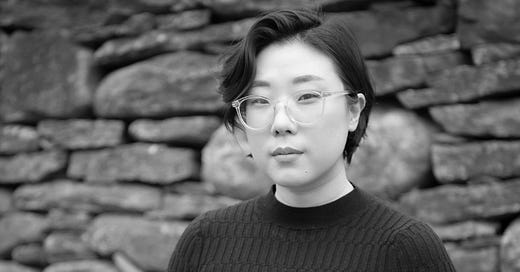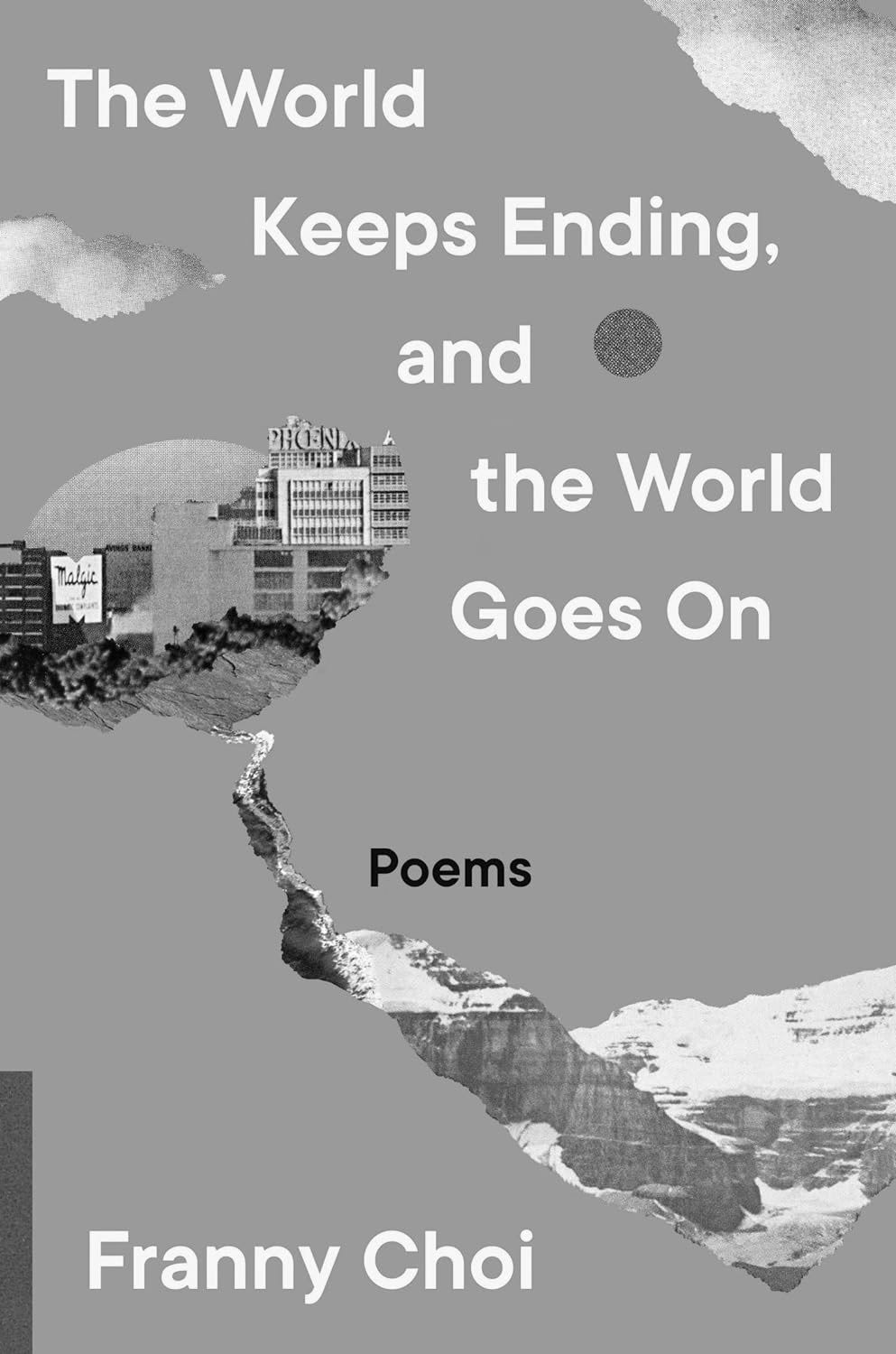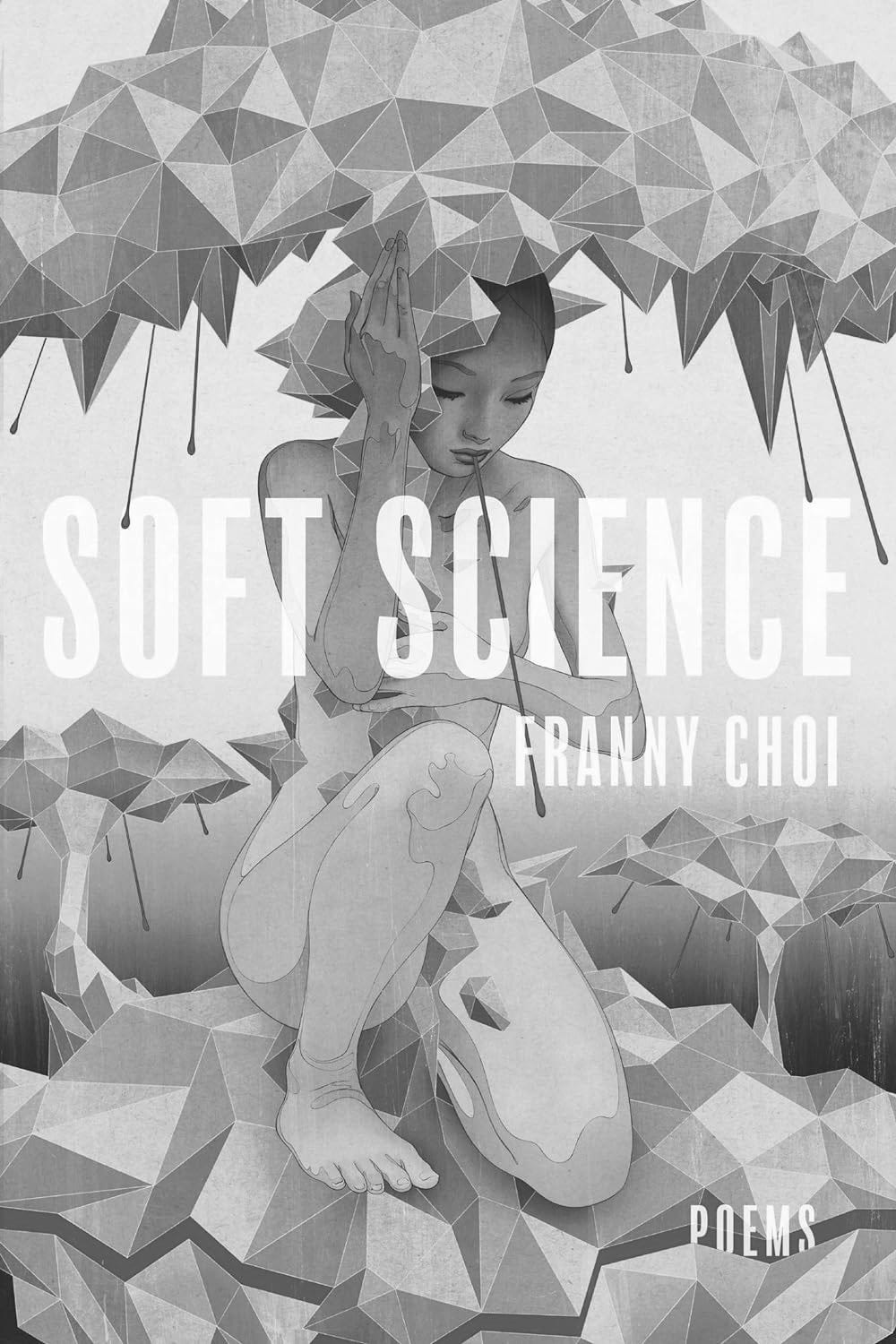Poets You Gotta Know: Franny Choi
"the apocalypse remembered, our dear, beloved apocalypse—it drifted / slowly from the trees all around us, so loud we stopped hearing it."
Franny Choi is a great damn poet — they are one of my favorite poets making work today. I so admire their deft balance of honest utterance, unexpected and jarring imagery, and an enlivening lyricism. If asked “what’s the good word in American poetries?” I’d point you toward the marvelous Franny Choi.
Choi’s books include The World Keeps Ending, and the World Goes On (Ecco, 2022), a finalist for the Kingsley Tufts Poetry Award, Soft Science (Alice James Books, 2019), Death by Sex Machine (Sibling Rivalry Press, 2017) and Floating, Brilliant, Gone (Write Bloody Publishing, 2014). Their writing has appeared in the New York Times, the Atlantic, the Paris Review, and elsewhere. They have two books forthcoming: a collection of essays about robots, and an anthology, We the Gathered Heat: Asian American and Pacific Islander Poetry, Performance, and Spoken Word, co-edited with Terisa Siagatonu, No‘u Revilla, and Bao Phi. Franny is Faculty in Literature at Bennington College, and the current Poet Laureate of Northampton, MA.
For Poetry’s “Harriet Blog,” Rebecca Morgan Frank writes: “In Franny Choi’s third full-length collection, The World Keeps Ending, and the World Goes On, the apocalyptic future is now. And it is also the past: repetition is the pulse of this book in subject and practice.” In The Believer, Stephanie Burt adds: “Choi’s voices are overwhelming, and overwhelmed, ‘counting my life mostly / as a series of small, terrible stories’ within the larger terrible stories of ecological devastation, endless international conflict, police violence, exhausted soil, and oil-plagued seas. They mimic our own sense of overwhelm.” And in her beautiful long review in The Los Angeles Review of Books, Sharon Lin writes: “Does one simply accept that to survive means to be continually “beached” upon the endless shore? Living involves bearing witness to destruction, enduring a life haunted by horrors. Extinction implies the end of all meaning. But there is recourse, in the form of recovery: ‘When disaster comes, some of us will stand on the rooftop to address the ghosts. Some of us will hold the line. Some will look for the shards, run our tongues along the floor.’ Choi shows how it is possible to be all three at once: to reckon with loss while also welcoming future possibilities.”
Lit Hub included Soft Science in its “Dissenting Opinions” selection of best books of the past decade, with Book Marks Assistant Editor Katie Yee proclaiming: “Read it! Something in her exploration of technology, of bodies, of womanhood, of the things we ask of each other will dig its hooks in you.” Publishers Weekly writes: “In her second collection, Choi (Floating, Brilliant, Gone) creates an exhilarating matrix of poetry, science, and technology. The speaker states her method at the outset: ‘you start with// what you know / hands, hair, bones, sweat / then move toward what you know /// you are// not / animal, monster, alien, bitch.’” In Strange Horizons, Lesley Wheeler writes of Soft Science: “Choi’s book is fantastic down to its DNA. It also offers fireworks enough for everyone, whether you’re excited about the queerness of cyborgs, the nature of consciousness, or the porous boundaries of contemporary lyric poetry.” (Also: how awesome to have your book of poems reviewed—and explored so deeply and beautifully—in a predominately SF publication such as Strange Horizons; hell yeah, Franny Choi.) And in her wonderful long essay, “Beyond (and Behind and Before) the Science News" for PoetryNW, Jessica Johnson writes: “Choi acknowledges the ways in which we’re made—determined by various kinds of parents and histories and languages—and holds them in conversation with the never-boring sensory drama of being alive in a body, with and without the bodies of others.”
Here are a few poems for y’all to get deep into — but be sure to pick-up copies of Choi’s books posthaste!
Celebrate Good Times
The regime is having a birthday party, so we turn off the lights and pretend we’re sick. All night, happy americans honk their horns. We did it! they scream into our window. In the morning, We is all over the floor. We sweep We into a paper bag and label it EMERGENCY. The good news is that things will go back to the way they were, which is also the bad news. Meanwhile, I cut an onion, and it’s onions all the way down, and that’s a fine reason to cry at the sink on a Monday after the empire congratulates itself on persisting again. No, thank you, I’m stuffed, I couldn’t possibly have more hope. I haven’t finished mourning the last tyrant yet. I haven’t said enough goodbyes to—oh, what was her name? And hers? How many We’s did they cut out of me? And whose country was I standing on, the last time we survived? (Originally published in The Nation)
Catastrophe Is Next To Godliness
Lord, I confess I want the clarity of catastrophe but not the catastrophe. Like everyone else, I want a storm I can dance in. I want an excuse to change my life. The day A. died, the sun was brighter than any sun. I answered the phone, and a channel opened between my stupid head and heaven, or what was left of it. The blankness stared back; and I made sound after sound with my blood-wet gullet. O unsayable—O tender and divine unsayable, I knew you then: you line straight to the planet’s calamitous core; you moment moment moment; you intimate abyss I called sister for a good reason. When the Bad Thing happened, I saw every blade. And every year I find out what they’ve done to us, I shed another skin. I get closer to open air; true north. Lord, if I say Bless the cold water you throw on my face, does that make me a costume party. Am I greedy for comfort if I ask you not to kill my friends; if I beg you to press your heel against my throat—not enough to ruin me, but just so—just so I can almost see your face— (Originally published in The Atlantic.)
Introduction to Quantum Theory
There are only so many parallel universes that concern us. In one, he isn’t dead. In another, you drink light with your hands all winter. There is a universe in which no one is lying emptied in the street as the gas station burns, a universe in which our mothers haven’t learned to wrap their bones in each small grief they’ve found. There is a universe in which there is no difference between the past and the ground. Another where the oceans pull the moon. And so on. This is an incomplete list. It has been abridged for your comfort. I could tell you about the many universes in which bad things happen to people other than the people you love. Yes, in another life, it’s someone else’s sister who climbs to the roof that night. In another life, the boys rise darkly from the asphalt to choke the engines of cruisers, and no one gives birth chained to a hospital bed, and no one’s child washes blue, ashore. Sure. You can have these worlds. You can warm them in your hands at night. But know: by signing, you agree also to be responsible for the universe where the oceans glow red, the universe where what we call shadow is pulsing with the musk of hooves, and especially the one in which humans exist, but only in the nightmares of small children. Will you hold that one too? The version of the story that never learned to consider sound? and the one where sound is only the opposite of metal? and the one where the sound of metal is never enough to quiet the dead? (Originally published in The Adroit Journal.)
Follow Franny Choi on Instagram @fancyrhino, keep an eye out for their new poems and books, and make sure to go see them if they are ever reading in your area!









Yes! Love Franny Choi’s poetry!